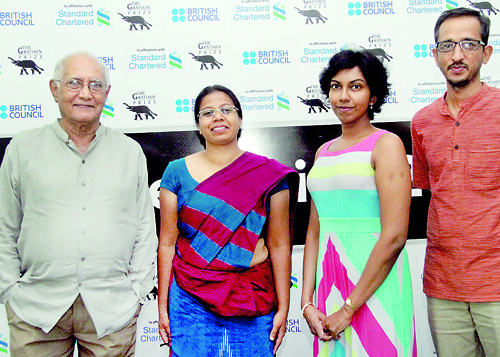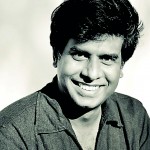Sunday Times 2
The Gratiaen shortlist: Three authors show a strong literary footprint
Poetry dominated the 2013 Gratiaen Prize with three collections of poetry being shortlisted this year. The shortlisted writers are Inosha Ijaz (This Nothingness), Chamali Kariyawasam (A Patchwork Soul) and Malinda Seneviratne (Edges).
At an event hosted by The British Council, the judges commented on Inosha’s raw, unpolished, distinctive literary voice and the originality of her engagement with literary forebears. They highlighted the appropriation of Hindu mythology and fusion of myth combined with the intensely personal in Chamali’s poetry. Malinda’s ability to capture intense emotion without falling into the easy trap of sentimentality was commended along with his control over his craft.

Chamali Kariyawasam ( second from right)- the only one of the three shortlisted authors who was present at the Gratiaen shortlist announcement ceremony seen here with the panel of judges- from left- Tissa Devendra, Dr. Shravika Damunupola Amarasekera and Vijay Kumar Nagaraj. Pix by Indika Handuwala
Speaking on behalf of the panel, Tissa Devendra, commented on the varied mix of genres and expansive scope of subjects dealt across the 55 works submitted this year- from historical romances, fantasy, socio-political commentary, biographies and themes of nostalgia, love, loss and the spiritual. Lack of consistency in literary elements and devices, an over-emphasis on documentary, wooden characterisation and an absence of depth and context were marked weaknesses across the varying spectrum of works, he said.
“In the end, as judges, we shortlisted only those works which we unanimously agreed reflected to the relatively highest level, a consistent combination of creative originality, imaginative richness, linguistic range and innovation, a sensitivity to the human condition, and a strong and distinct literary footprint,” remarked Mr. Devendra, Chair of this year’s panel.
The judges for the Gratiaen Prize 2013 are Tissa Devendra, Dr.Shravika Damunupola Amarasekera and Vijay Kumar Nagaraj. Tissa Devendra read English and French at the University of Ceylon, holds a postgraduate degree from Cambridge and has had a distinguished career in the Public Service, working around Sri Lanka. Dr. Amarasekera is a Senior Lecturer at the Department of English at the University of Colombo and has published works on childhood, ethnicity and Sri Lankan fiction in English. Vijay Kumar Nagaraj who rounds up the triumvirate of judges is a researcher, writer and teacher and has taught at the Tata Institute of Social Sciences in Bombay, India.
The Gratiaen Prize which was founded by Michael Ondaatje in 1992 with the money he received as a joint-winner of the Booker Prize for The English Patient, is named after Ondaatje’s mother, Doris Gratiaen. It is awarded annually to the best literary works in English written by Sri Lankan writers residing in Sri Lanka and is presented in affiliation with Standard Chartered Bank. The winner of The Gratiaen Prize 2013 will be announced on May 24, 2014.
Meet the shortlisted writers:
Inosha Ijaz:

Inosha Ijaz
- Could you give us a brief description of your background and writing history?
Well, I’m a simple 20-year-old, from Raddolugama, Sri Lanka. Being the only child I was occupied in a lot of self-centred activities like reading from as far as I can recall. Lyceum International School, Wattala was more than the place I was schooled; it was my second home and was instrumental in moulding me into a far better person, honestly, as far as writing and all the tools demanded of a decent writer is concerned. Currently, I’m a second year medical student at the Manipal College of Medical Sciences, Pokhara.
I’ve always been a pretty decent reader. Poetry however never failed to fill my heart with wonderment. If I remember right, the first ever official poem I wrote was in grade 9 or so; that too I was forced to write by my teacher and beautiful human being, Ms Dinali Nanayakkara. It was recognised at an award ceremony of a much less magnificent calibre and that probably gave me a boost to take my writing to another level as far as seriousness was concerned.
So I wrote. A lot. It became my comfort zone. They say writing is therapeutic, and no matter how overrated it may sound, I must say, it’s as true as true can get. On another texture, it’s extremely gratifying because, when you write, you naturally become a much enthusiastic observer of pretty much everything and in so doing; life becomes a far more interesting residence.
After completing schooling in 2010, I worked on a simple blog as the initial platform to expose my immature work. Then I freelanced for The Nation. The Nation gave me an opportunity to publish my work and that really meant a lot. I’ll always be grateful for that. In addition I also submitted my poetry to some other papers and magazines. In 2012, I joined MCOMS to pursue my dream of becoming a doctor. Writing however is my passion and I’d never give up on that no matter the circumstance. So whenever time permits, my friends would find me stuck up in the room or in the balcony with a pen and paper and nothing less.
- What/who are your literary influences?
I wish I could enlist a couple of names just like that but it’s never that easy. Poetry is about delivering the observed, the felt, the experienced, the learnt, and what not. And to do so most skilfully requires a lot of inspiration. Every piece of writing one reads inspires him/her to a certain extent. The magnitude of that extent however varies. That said, I believe every word I word is a result of every single piece of writing I’ve come across and learnt from at some point in time, but if I were to assess and conclude the names that pop up within the blink of an eye when the word “literary influences” or rather “inspiration” comes up, I’d have to go with this: I’ve read a lot of Neruda’s work and I personally feel he’s a brilliant poet who can make the reading experience a truly splendid one for a moment or two that’d last a lifetime. I’m certain many would agree with me on that.
Equally inspirational had been Malinda Seneviratne’s poetry. He’s been shortlisted for the Gratiaen award 2013 too. His poetry I’ve read; I’ve been inspired by. Actually speaking though, literary influences aren’t always literary personalities. It can vary. From a simple gesture, to a song, to a tear, to an emotion, to a word, to anything and everything that strikes a chord in the deepest dents of our being; sometimes, that’s influence enough; that’s inspiration enough.
- Could you elaborate a bit about your writing and choice of genre? What kind of themes do you usually write about?
I love poetry. I love prose too, but poetry speaks to me the most and so I enjoy writing poetry the most for the sake of self and readership. A collection of poetry is an ambitious meditation and as far as my writing is concerned I’ve not really taken into account what types of poems I want to be known for, or disparaged for, for that matter. If I feel strong enough about something, I tend to word it. It’s difficult to really pinpoint and name a theme I write of oft. We live in different dimensions, and landscapes at different times and our thought processes, influences, vary accordingly. In the collection “This Nothingness” for instance, I speak of you and I. Feel free to categorise it as you please, but to me it’s a meditation of you and I, nothing more or less. As far as themes are concerned, I guess, I’ve a tendency to dwell on less political themes at this point in time. But as with all things worldly, depending on the varying dimensions and landscapes, this may or may not alter.
Chamali Kariyawasam:
- Could you give us a brief description of your background and writing history?
Writing poetry began as a childhood hobby. However, I started intermittently publishing selected poems written over the years, in the late 1990′s. My debut poetic anthology “Sylphlike Ether” was nominated for the Gratiaen Prize 2007 while still in manuscript form. It was later published and won the State Literary Award, in 2010.
As my academic and professional background is related to financial services, I have in parallel continued my writing, perhaps not giving it as much time and focus as it deserves. I currently work as an independent consultant in mainly capital market, research and corporate advisory projects.
- Could you elaborate a bit about your writing and choice of genre? The use of Hindu mythology was quite interesting.
A: I have always preferred poetry although I have also attempted to write short stories. The themes that show up in the current manuscript were not really a conscious choice. It is more the accidental accumulation of subjects that one is interested in.
I have an interest in religious and folk beliefs and these aspects show up in the poetry. I was interested in Sanskrit perhaps inadvertently influenced by my parents. So the interest in Hindu mythology grew together with the interest in dance, in which worship and story-telling feature.
Dance of Asian and Afro-Cuban/ Latin American origin has been a long standing interest for me. My writing is hence influenced by movement, music and vocal traditions pertaining to some dances. The gender based poetry is just my way of trying to make sense of what my friends, myself and strangers alike experience, feel and overcome as women.
Malinda Seneviratne:

Malinda Seneviratne
- Could you give us a brief description of your background and writing history? How do you balance the journalistic aspect of your writing along with poetry?
I studied sociology and not literature. I wanted to be an academic and so I wrote. I grew up among books. My parents read English Literature in Peradeniya. My father is a published and recognised poet. He was a respected literary critic. My mother taught Literature. So reading, appreciating literature and writing was just another of those growing-up things. It is not surprising that my sister, Ru Freeman is a novelist or that my brother Arjuna pens brilliant essays on all kinds of subjects. I wandered into journalism and so I write for a living. Poetry is different. I was drawn more to poetry than prose and that’s perhaps why I write poems and not short stories or novels. There’s nothing to balance as such. One doesn’t balance eating and breathing, taking children to school and taking a nap. We do what we have to do and those ‘doings’ are prompted by different needs, writing poetry and writing an editorial included.
- Could you elaborate a bit about your writing and choice of genre? The judges mentioned that there’s an interesting mix of the personal and political in your writing. Any themes which resonate in particular?
I am not contracted to write poetry, although I do employ that genre in some aspect of my professional work. They say that journalists can’t write novels because they have word limits and don’t want to test the patience of their editors. But I started writing poetry long before I wandered into what has now become my profession. As I said, I was drawn to poetry. I think life is too complex a thing to describe in full. I think that poetry is less pretentious in that it just touches something, draws some dust and indicates that perhaps there’s a universe embedded in each particle. It does not show but rather suggests that there are many ways of seeing. I obtain more from revisiting poetry than from re-reading novels, if that helps explain preference.
‘Edges’ contains almost all the poems I wrote in 2013. Different things inspire me at different times; politics is one of those things. I did not write to a theme as such, but I noticed that there was one, that of exploring the boundaries of words or definitions which are of course arbitrary as well as reflective of definer’s ignorance and arrogance. If you want a ‘thread’, it’s made of the fundamental concepts of Buddhism such as Jathi, Jara and Marana (birth, decay and death), the twin notions of wisdom (pragnna) and compassion (Maithree), the Sathara Brahma Viharana or the Four Sublime Modes of Living, framed of course by the Buddhist Charter of Free Inquiry, the Kalama Sutra. It is not that I used these as crafting tools, but I suppose they are things I reflect on enough and therefore tend to walk with my words.

